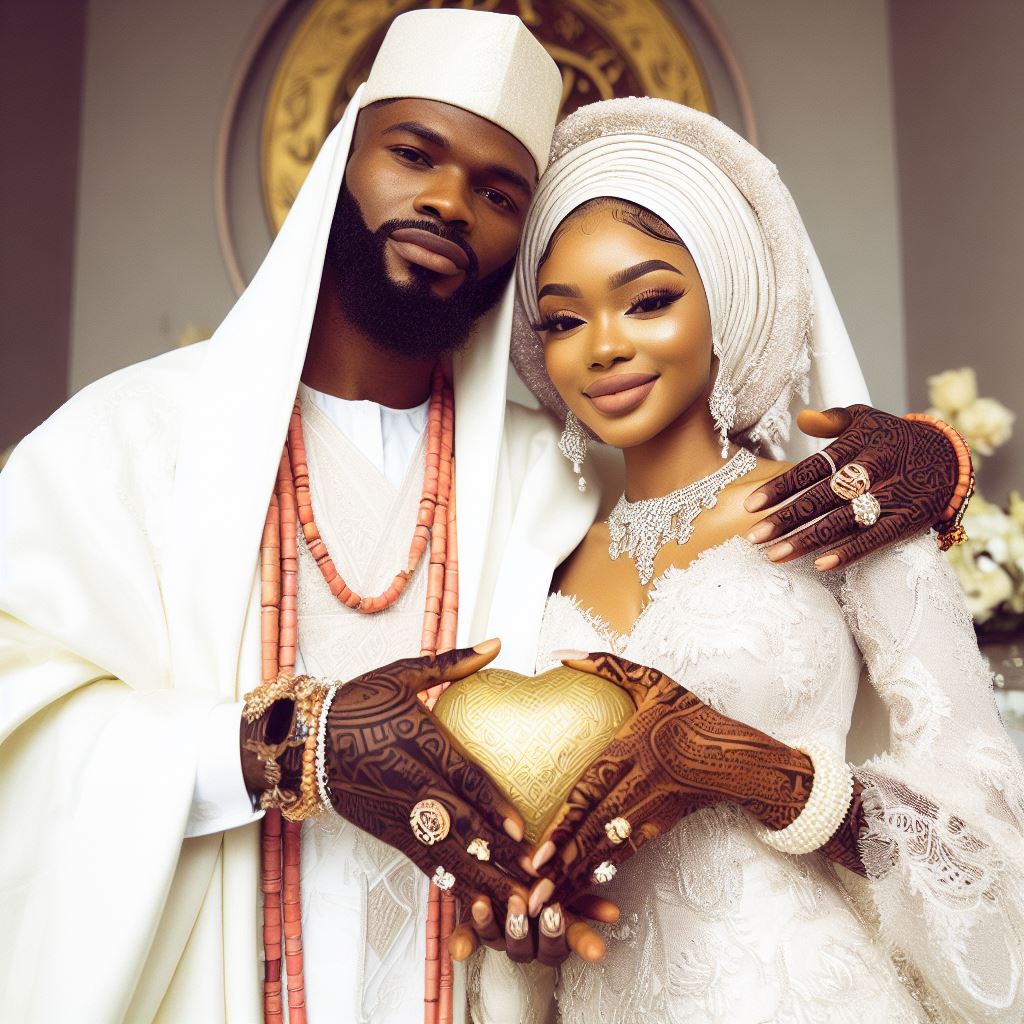Introduction
Nigerian marriage traditions are rich with cultural customs and rituals.
Involving families in Nigerian proposals is crucial for a successful and meaningful union.
Nigerian marriage traditions are deeply rooted in the country’s diverse cultural heritage.
From the Igbo to the Yoruba to the Hausa tribes, each community has its unique way of celebrating unions.
These traditions play a significant role in Nigerian society, shaping relationships and family dynamics.
In Nigerian proposals, families are actively involved in the process, ensuring the union is not just between two individuals but also between two families.
Unlike in Western cultures where proposals are often kept private, Nigerian proposals are communal events.
Family members and important relatives gather for a formal introduction and to express their support for the union.
The involvement of families brings a sense of security and unity to the couple.
It ensures that the marriage is not just about love but also about the intertwining of two families.
Nigerian families believe that involving them in the proposal process helps to prevent future misunderstandings and conflicts that could arise in the future.
Additionally, it reinforces the values of respect, honor, and loyalty within the family unit.
Another crucial aspect of involving families in Nigerian proposals is the support and guidance they offer to the couple.
Families provide advice and wisdom based on their experiences in marriage, allowing the couple to navigate the complexities of married life with a strong support system.
In conclusion, Nigerian marriage traditions highlight the importance of involving families in proposals.
This involvement strengthens family bonds, promotes unity, and offers guidance to the couple as they embark on their journey together.
Historical background of Nigerian proposal customs
Influence of traditional and cultural practices
- Traditional practices in Nigeria have long played a significant role in marriage proposals.
- These practices are deeply rooted in the rich cultural heritage of diverse Nigerian ethnic groups.
- Each ethnic group has its unique customs and traditions when it comes to proposals and marriage.
- Some common practices include the involvement of family members, elders, and traditional leaders in the process.
- These traditional practices have been passed down through generations and continue to shape proposal customs in Nigeria.
Role of families in selecting potential partners
- Nigerian families play a crucial role in the selection of potential partners for marriage.
- Parents and extended family members are highly involved in the process of finding a suitable spouse.
- They consider factors such as compatibility, socio-economic status, and family background.
- The opinion and approval of both families are traditionally sought before a marriage proposal can proceed.
- The involvement of families ensures that the proposed union is accepted and supported by the larger family unit.
Evolution of proposal customs over time
- Proposal customs in Nigeria have evolved over time due to various factors.
- Modernization, globalization, and the influence of Western cultures have brought changes to traditional practices.
- While some families still adhere strictly to the traditional customs, others have adopted more contemporary approaches.
- There is now a shift towards individuals having more agency in choosing their partners.
- Love, compatibility, and personal preferences are increasingly considered alongside traditional considerations.
In conclusion, the historical background of Nigerian proposal customs reveals the influence of traditional and cultural practices.
Families play a significant role in selecting potential partners, ensuring compatibility and family approval.
However, these customs have also evolved over time, with modern influences and individual agency shaping contemporary proposal customs in Nigeria.
Read: Real Stories: Nigerian Couples Who Chose to Marry Immediately
Role of the groom’s family in Nigerian proposals
Seeking the approval and blessings of the bride’s family
In Nigerian proposals, it is customary for the groom’s family to seek the approval and blessings of the bride’s family.
This is an important step in the process of marriage and signifies the respect and honor given to the bride’s family.
The groom’s family may visit the bride’s family and formally ask for their consent and blessings for the union.
Traditional obligations and responsibilities of the groom’s family
The groom’s family in Nigerian proposals have various traditional obligations and responsibilities.
They are expected to provide the necessary financial and material support for the wedding ceremony.
This includes covering the costs of the engagement ceremony, traditional marriage rites, and the wedding reception.
The groom’s family also plays a significant role in coordinating the various activities and logistics involved in the wedding preparation.
Arranging meetings and negotiations with the bride’s family
Another important role of the groom’s family in Nigerian proposals is to arrange meetings and negotiations with the bride’s family.
This is done to discuss and agree upon the terms of the marriage such as the bride price or dowry.
The groom’s family takes on the responsibility of initiating these discussions and ensuring that both families reach a mutual agreement.
During these negotiations, the groom’s family presents gifts, known as “list” or “items,” to the bride’s family.
These items typically include symbolic offerings such as kola nuts, palm wine, and other traditional artifacts.
The bride’s family carefully examines these items and usually negotiates their value and quantity.
This process reflects the cultural significance of the groom’s family in ensuring the success of the marriage proposal.
In addition to the negotiations, the groom’s family may also be involved in organizing the engagement ceremony, which serves as a formal announcement of the couple’s intention to marry.
This event involves the exchange of gifts, the formal introduction of the families to each other, and the exchange of vows between the couple.
The groom’s family takes an active role in coordinating and facilitating this ceremony.
Overall, the role of the groom’s family in Nigerian proposals is vital in ensuring the successful union of the couple.
They seek the approval and blessings of the bride’s family, fulfill traditional obligations and responsibilities, and arrange meetings and negotiations with the bride’s family.
Through these actions, they contribute to the cultural and social fabric of Nigerian marriages, strengthening family ties and fostering unity and harmony.
Read: Anniversary Wishes: Infusing Hausa Traditions
Role of the bride’s family in Nigerian proposals
A Nigerian proposal is not just a union between two individuals, but also between two families.
The role of the bride’s family in this process is crucial and involves several important aspects.
Assessing the groom’s suitability for their daughter
Before accepting a proposal, the bride’s family takes the responsibility of evaluating the groom’s suitability for their daughter.
They consider factors such as the groom’s character, family background, and reputation in the community.
Assessing the groom’s suitability ensures that their daughter will be entering into a respectful and loving relationship.
The family wants to make sure that the groom will treat their daughter with care and provide a stable environment for her.
Ensuring compatibility and shared values between families
In Nigerian culture, families play a crucial role in the success of a marriage.
The bride’s family ensures that there is compatibility and shared values between both families.
They want to ensure that the couple comes from similar backgrounds and can harmoniously integrate into each other’s lives.
By evaluating the compatibility and shared values, the bride’s family aims to minimize the potential for conflicts and misunderstandings in the future.
They want to create a strong foundation for the couple’s future life together.
Evaluating the groom’s financial readiness for marriage
Financial stability is an essential aspect that the bride’s family considers before approving a marriage proposal.
They evaluate the groom’s financial readiness and ability to provide for their daughter and potential future children.
Nigerian families believe that a financially stable groom can ensure a comfortable life for their daughter.
They look for qualities like a stable income, good financial management, and an ability to support the family’s needs.
In conclusion, the bride’s family plays a crucial role in Nigerian proposals by assessing the groom’s suitability, ensuring compatibility and shared values, and evaluating the groom’s financial readiness.
Their involvement aims to ensure a successful and thriving marriage for their daughter.
Read: Diamond, Gold, or Silver? Picking the Right Material in Nigeria
Types of Nigerian proposals involving families
In Nigerian culture, the role of families in marriage proposals is deeply rooted and significant.
The process of proposing in Nigeria varies depending on the region, but there are common types of proposals involving families that have been followed for generations.
This chapter explores the different types of Nigerian proposals and how they have been influenced by modernization and globalization.
- Traditional proposals involving elders and family representatives
- Modern proposals with consent and involvement of both families
- Influence of urbanization and globalization on proposal customs
Overall, the role of families in Nigerian proposals remains crucial.
While traditions and customs may evolve over time, the importance of familial support and approval remains at the core of the marriage proposal process.
The different types of Nigerian proposals involving families reflect the balance between preserving cultural values and embracing individual desires.
Whether traditional or modern, these proposals serve as a testament to the unity and strength of Nigerian families and their role in shaping the future of marriages in the country.
Read: Stories of Love: Real-life Nigerian Marriage Contract Tales

You Might Also Like: Traditional Yoruba Marriage Wishes for Friends
Benefits and challenges of involving families in Nigerian proposals
Strengthening family bonds and ensuring support networks
- By involving families in proposals, it strengthens the bonds between family members.
- Family members can provide emotional support and encouragement throughout the proposal process.
- Having a support network can alleviate stress and help individuals navigate challenges more effectively.
- Through involvement, families become more connected and develop a stronger sense of unity.
Upholding cultural traditions and preserving heritage
- Involving families in proposals allows for the preservation of cultural traditions and practices.
- Family members can contribute their knowledge and expertise in traditional ceremonies and customs.
- These ceremonies and practices serve as a reminder of Nigerian heritage and promote cultural identity.
- By involving families, future generations can continue to celebrate and embrace their cultural roots.
Potential conflicts and concerns in navigating family dynamics
Involving families in Nigerian proposals has benefits:
- Strengthens family bonds, providing emotional support and encouragement.
- Upholds cultural traditions and preserves heritage.
- Family expertise enhances traditional ceremonies, promoting Nigerian culture.
Challenges include:
- Differing opinions and conflicting family ideas may lead to disagreements.
- Power dynamics and hierarchy within the family can affect decision-making.
- Balancing individual desires with family expectations can cause tension.
Open communication and compromise are essential in managing potential conflicts.
Despite challenges, family involvement in Nigerian proposals brings unity, support, and cultural preservation.
Discover More: The Interplay of Genotype, Blood Group, and Fertility in Nigeria
Tips for navigating the role of families in Nigerian proposals
In Nigerian culture, the role of families in marriage proposals is highly significant.
It is essential to understand and respect the cultural norms and traditions surrounding this process.
Here are some tips to help navigate the role of families in Nigerian proposals:
Communicating openly with both families about expectations
Effective communication is crucial when navigating the involvement of families in Nigerian proposals.
It is important to have open and honest discussions with both families about their expectations and desires for the marriage.
This will help set clear boundaries and ensure a smooth process.
During these conversations, both parties can express their visions for the proposal, including any specific traditions or customs they would like to incorporate.
By understanding each other’s perspectives, it becomes easier to find common ground and plan a proposal that respects everyone’s wishes.
Respecting cultural norms and traditions throughout the process
Nigerian culture is rich in traditions and customs, and it is essential to respect and honor these throughout the proposal process.
Familiarize yourself with the specific customs of the families involved and make an effort to ensure they are upheld.
For example, if there are specific ceremonies or rituals that traditionally take place during a proposal, make sure to incorporate them respectfully.
This may include seeking input from the elders or involving them in decision-making processes.
By doing so, you show respect for the culture and strengthen family ties.
Seeking guidance and advice from elders and experienced individuals
When navigating the role of families in Nigerian proposals, seeking guidance from elders and experienced individuals can be invaluable.
These individuals have a deep understanding of the cultural customs and can provide advice based on their own experiences.
Consider seeking the counsel of elders from both families, as well as individuals who have previously gone through a similar proposal process.
They can offer insights, suggestions, and potential pitfalls to avoid.
Their wisdom and guidance will help ensure that the proposal respects the traditions and strengthens family bonds.
In conclusion, successfully navigating the role of families in Nigerian proposals requires open communication, respect for cultural norms, and seeking guidance from experienced individuals.
By fostering strong relationships with both families and incorporating their desires and traditions, you can create a memorable and meaningful proposal that reflects Nigerian culture and strengthens family bonds.
Conclusion
Recap of the importance and significance of family involvement
Family involvement in Nigerian proposals is paramount.
It brings cohesion and cultural richness to the process.
Families provide invaluable support, wisdom, and connections, making proposals more holistic and meaningful.
The collective knowledge and experience of families enrich the decision-making, ensuring the proposals align with cultural values.
Emphasize the need for understanding and collaboration between families
Collaboration and open communication between families are crucial for successful proposals.
Understanding each other’s expectations, aspirations, and concerns leads to more harmonious and purposeful proposals.
Involving both families fosters unity, reducing conflicts, and fostering a shared vision for the future.
Closing thoughts on the role of families in Nigerian proposals
In conclusion, families are the cornerstone of Nigerian society and play a vital role in proposals.
Their involvement ensures proposals reflect cultural depth, values, and a shared commitment to a prosperous future.




